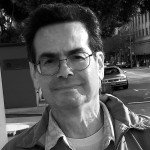David Hathwell
 David Hathwell is a former English teacher living and writing in the Bay Area. He has degrees in English, from Stanford and Columbia, as well as an advanced degree in music theory, from CUNY, and is now a piano student at the San Francisco Conservatory of Music. His poems appear in The MacGuffin, Raintown Review, Slant, Driftwood Press, and Measure, and online at Cider Press Review, Blast Furnace, Angle, and Cordite Poetry Review. Muses, a chapbook, is forthcoming from David Robert Books.
David Hathwell is a former English teacher living and writing in the Bay Area. He has degrees in English, from Stanford and Columbia, as well as an advanced degree in music theory, from CUNY, and is now a piano student at the San Francisco Conservatory of Music. His poems appear in The MacGuffin, Raintown Review, Slant, Driftwood Press, and Measure, and online at Cider Press Review, Blast Furnace, Angle, and Cordite Poetry Review. Muses, a chapbook, is forthcoming from David Robert Books.
What is your creative process?
Unfortunately it can’t be subdued to a schedule. If an idea for a poem passes the test of viability, I’ll gear up for execution. An idea won’t be “viable” until I’ve found some of the poem’s essential wordings and have ideas for how to start, how to finish, and how to get to the finish (all subject to revision). I’ll take notes, but I try not to commit much to paper yet, since that seems to close off freer possibilities. When my brain fills up—holds more ideas than I can recall—it’s time, willy-nilly, to move toward the written word. Then comes the hit-and-miss of practical creative thought (increasingly, as work advances, a form of high-level problem solving), which continues on and off throughout the day, and sometimes during the night, when a different kind of thought seems possible. (Mornings are often a time for unloading the night’s yield.) There’s no anticipating how long it will take to finish the job—rarely days, usually weeks.
If that sounds like unrewarding struggle, here’s how I’ve described the sensations of successfully concluding the process: “When the song is right / I’m muscled and lean / And have turnout. // I rise from my desk, / Majestic, and I dance. / Oh how I dance.”
What are you reading right now?
Conversations with Richard Wilbur and Wilbur’s 2010 collection, Anterooms.
What are some of your favorite books?
Of nineteenth-century novels, Middlemarch. Of twentieth-century, The Sound and the Fury. (I was lucky to teach this wonder—that is, to take up the challenge of reading it, and reading it well.) In shorter fiction, Alice Munro’s stories. In poetry, Wilbur’s and Elizabeth Bishop’s collected poems.